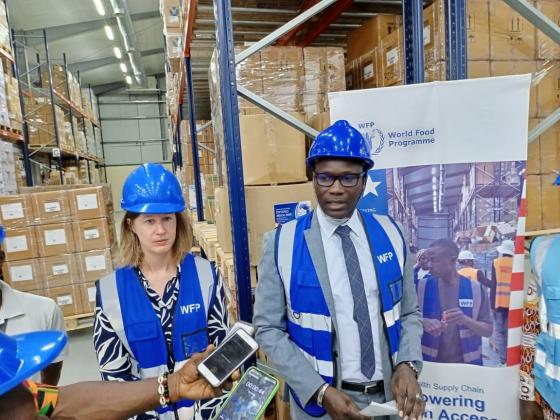Liberia: WFP Takes Over Ministry of Health Drug Delivery Services

The World Food Program (WFP), in partnership with the Ministry of Health and its development partners, has assumed control of drug delivery across the country and the management of its Central Medical Stores (CMS).
The partnership, which was signed early in July of this year, is supported by USAID and the Global Fund to strengthen the country’s healthcare supply chain services across the country through efficiency and reliability.
WFP Country Director to Liberia, Dr. Aliou Diongue, who spoke to reporters on Tuesday at the CMS head office in Samukai Town, Caldwell, explained that the collaboration with the Ministry of Health aims to overcome past challenges in drug delivery to health centers across the country, including delays and drug expiration.
“Through our demonstration and expertise in large-scale supply chain management, the Government of Liberia and its development partners negotiated with us for an expanded partnership whereby WFP takes on additional responsibilities, including managing the government's central medical stores in Liberia,” he said.
Diongue highlighted the significance of partnership, indicating, "This strategic alliance stands as a testament to our commitment to supporting not just one but ten essential health programs. It marks a pivotal moment in healthcare logistics, addressing past challenges and ensuring a more effective delivery system to meet diverse healthcare needs."
According to him, the collaboration between the WFP and government through the Ministry of Health has brought significant changes to the healthcare system in Liberia.
Diongue narrated that through its health supply chain the strategic approach will ensure a consistent and timely flow of resources to meet the healthcare needs of communities throughout Liberia.
WFP Liberia’s Country Director said the partnership further demonstrates the power of collaborative efforts to address critical healthcare challenges in the country and around the world.
He noted that the collaboration's objectives also include the improvement of warehouse management, commodity security, and the availability of health commodities throughout Liberia.
Diongue said the essential health programs supported by WFP cover a wide array of crucial initiatives, including the essential drugs program, national AIDS control program, reproductive health program, national malaria control program, national leprosy, and tuberculosis control program, neglected tropical diseases, non-communicable diseases, eye health program, mental health program, and the medical supplies program.
According to him, the initiative has already made significant strides, backed by an impressive inventory of 907 units of medicine valued at twenty-one million and a staggering 561 shipments, totalling 159 metric tons of health supplies. This collaborative effort stands as a testament to the impactful alliance between WFP and its dedicated donors.
He said addressing long-standing issues such as delays and drug expiration, the partnership not only resolves historical challenges but also fosters an environment encouraging more donor involvement.
He further noted that USAID and Global Funds, among others, play a crucial role in ensuring a substantial inventory to meet the nation's healthcare demands.
Currently operational in 13 out of 15 counties, WFP's extensive coverage demonstrates its unwavering commitment to extending its reach across the entire nation, Diongue concluded.
